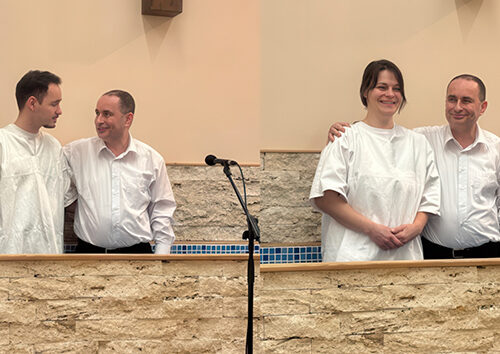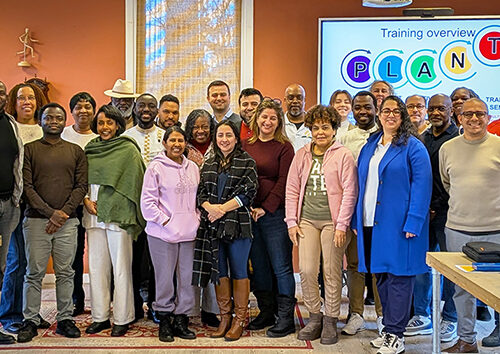14 March 2020 | Tallinn, Estonia [Mervi Kalmus]
When Coronavirus stops church there is time for reflection.
A couple of weeks ago I was reading a book by my favourite author, Frederick Buechner. In his brilliant memoir Telling Secrets I came across some lines that touched me very deeply. They had a special ring of truth to them.
Buechner says, “I wonder if the best thing that could happen to many a church might not be to have its building burn down and to lose all its money. Then all that the people would have left would be God and each other.”
Little did I know that a mere two weeks later our Government would declare a national emergency in a desperate bid to contain Covid-19 and that the emergency would include temporarily closing of all our churches.
Little did I know that just a handful of days after reading this quote, I would wake up on Sabbath morning and realise that all I have left is God and my people. No building. No services. No pastoral routine. Only God and my people.
Emotions are raw and I am still recovering from the day that followed the Government’s shock decision. That whole day felt like one long emergency meeting as we needed to react and make very quick decisions about the safety of our church members. By the evening I was emotionally exhausted. Not everything has settled in my mind, but I have a few thoughts that, in the middle of general confusion, have emerged clear and true.
Firstly, I miss my church so much! The Estonian Conference media team held an online church service so we could all “go“ to church — but in reality, we were all sitting in different living rooms, sharing selfies on our church’s Facebook chat, sharing our prayer requests, joking and keeping up a positive spirit. And despite all of that, it hurt me not to be able to be with them physically.
A young family in our church welcomed a baby boy last week and we couldn’t hug them on the Sabbath morning, we couldn’t put our hands on them and pray, couldn’t congratulate the grandparents. I couldn’t catch up with my friend who works abroad and who’s here this weekend. I couldn’t share a meaningful conversation with this or that person. I missed the guy who, after every service, goes and hugs everybody in our church. I missed our simple fellowship meal with our little ones running around. I missed all these things that I usually take for granted. Suddenly the magic of church – the magic of the body of Christ made of flawed, ordinary people – seems even greater and more powerful now that we can’t gather as a church for a while.
Secondly, I would be lying if I said I didn’t feel some secret relief once I realised there was no preaching or teaching left for me to do this Sabbath. Suddenly, unexpectedly, I faced a day of absolute rest. It felt odd. And it felt equally marvellous.
I couldn’t bear staying home alone for the whole day. I needed to share Sabbath with somebody, so I went and spent half of the Sabbath with the family of my mentor and good friend, Pastor Ivo Käsk (who just happened to resurrect himself from his 14-day quarantine, strong and healthy).
As Baltic Union President, Ivo was supposed to be preaching and teaching in another church, I was supposed to be preaching in my home church, and yet by this unimaginable turn of events, we found ourselves sitting on the same sofa, singing our hearts out to the hymns from the online service, giving our offerings through an online bank transaction, eating lunch together and then enjoying a family walk in nature. It was wonderful! And it all had the faint echo of Jesus’ words to it, “Come away with me. Let us go alone to a quiet place and rest for a while.” I barely ever get to “go away and rest” on Sabbath. Now, thanks to a worldwide pandemic, I do.
I have also realised how thin the line is between what we consider usual and unusual. It takes no more than a couple of weeks for an unknown virus to spread in our country, and everything is suddenly turned upside down. Everything that seemed so safe and stable is gone.
And what is left? Some people have a hundred and fifty rolls of toilet paper stacked in their closet. Somehow it makes them feel somewhat safe. Others are relying on Netflix to transport them to some better place. Many others are relying on enormous amounts of pasta and rice. Others look up to doctors and government members as if they were half-divine.
When I manage to stop reading the worrying news then take a couple of deep breaths, I realise my security comes from yet another source. It comes from the Lord of Hosts whose love for our sick and worrying humankind abounds all understanding.
What we have left is God and each other. And that is more than enough.
Mervi Kalmus is a pastor in Estonia. She is also a part-time lecturer at Newbold College.
tedNEWS Staff: Victor Hulbert, editor; Deana Stojković, associate editor
119 St Peter’s Street, St Albans, Herts, AL1 3EY, England
E-mail: [email protected]
Website: www.ted.adventist.org
tedNEWS is an information bulletin issued by the communication department of the Seventh-day Adventist Church in the Trans-European Division. Readers are free to republish or share this article with appropriate credit including an active hyperlink to the original article.



